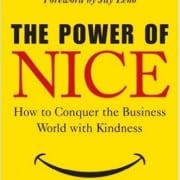The Power of Nice
I’ve been doing quite a bit of reading lately (a by-product of not being able to work using my own computer) and I’m enjoying the diversity of ideas that are coming through my selections. From the point of view of the stereotypical lawyer or law firm, the most subversive of these books is The Power of Nice, by Linda Kaplan Thaler and Robin Korval. The subtitle is, “How to Conquer the Business World with Kindness.” Makes you feel warm and fuzzy, doesn’t it — or is that the cold grip of skepticism?
The book’s rather unsurprising premise is that business success is facilitated by being nice. (I prefer the word kind to nice — perhaps because nice has become almost a backhanded slur.) The authors are in advertising, creating the campaign for the Aflac duck, among others. They offer 6 Power of Nice Principles:
1. Positive impressions are like seeds. In other words, being nice prompts a variety of untraceable positive effects.
2. You never know. You never know when being nice to a stranger will pay off — such as holding a door for someone as you’re both entering a building, only to discover that the person is your potential client.
3. People change. Be nice to everyone, regardless of social station or power. This principle is commonly known as, the feet you trample today may be the ones you have to kiss tomorrow.
4. Nice must be automatic. The story provided to illustrate this is that of a client who didn’t hire a particular consulting firm because an executive in the firm didn’t help her with her heavy bags when she arrived at the airport. Had nice been automatic for this guy, the authors argue, he wouldn’t have needed to remember to help a client but would have done for her what he would have done for anyone.
5. Negative impressions are like germs. This is the flip side of Principle #2. Nastiness begets nastiness.
6. You will know. Whether you’re nice or nasty, you face yourself in the mirror every morning and every evening. What do you want to see when you look into your own eyes?
So, perhaps none of these principles is rocket science. The remainder of the book provides tips on how to be nice without compromising what’s best for your business, plus “Nice Cubes,” which are small exercises designed to help the reader be nicer. One unintended benefit of reading the book is a reminder of the importance of story to getting a point across. When I sat down to begin writing this post, I had to look up the principles, but I could quote several of the authors’ illustrative anecdotes. Litigators, take note.
After I finished reading (which was only an hour and a half or so after I started, since the book is just over 100 pages), I started thinking about how the principles might apply for lawyers. It’s important to be nice to potential clients, and even more important to be nice to current and former clients, but that’s pretty much a no-brainer, right? (But what does nice entail here? Your answer is part of your “brand” as a lawyer. It’s worth some thought.)
What about being nice to opposing counsel? I hold that a lawyer may be nice/kind/amiable with opposing counsel without weakening his position. And fortunately, many lawyers have that skill. It’s the lawyers who don’t have it who make practice unpleasant. What would your interactions with opposing counsel look like if you were being nice without being weak?
Perhaps the most overlooked place for niceness is in interactions with our familiars: colleagues, staff, and even our own families. We justify being sharp and even rude because we’re pressured or stressed. (And I promise, I’m saying “we” because I do it too!) Some consultants and lawyers advise the use of an advance blanket apology (“when I’m rude later on this week, please know that I’m just stressed”), but I would suggest that’s a cop-out. Working relationships are improved by limiting the rudeness and by genuine, specific apology when necessary. Failure to take either of those steps damages working relationships. Being nice (which can be anything from saying “thank you” for a job well done to bringing in bagels for the team on occasion) builds relationships. It isn’t a panacea, but it helps.
And finally, I suggest that nice matters especially to job applicants. I’ve been rejected by a huge number of potential employers, and some of them stick out in my mind. I can almost list the law firms that didn’t even acknowledged my submission; I can definitely list the would’ve-been employers who were particularly kind in their response. And when I crossed paths with the hiring lawyer who wrote a rather nasty rejection letter, it was a real challenge to put aside that memory and to interact with her from a clean slate. She has a reputation as a good lawyer, but I have never and would never refer a case to her because I don’t trust that she would treat the client any better than she treated me.
It’s probably worth it to read The Power of Nice; it’s absolutely worth some reflection for each of us to consider how we might be nicer. I suspect that members of The Secret Society of Happy Lawyers harness the power of nice on a regular basis. How about you?




Leave a Reply
Want to join the discussion?Feel free to contribute!